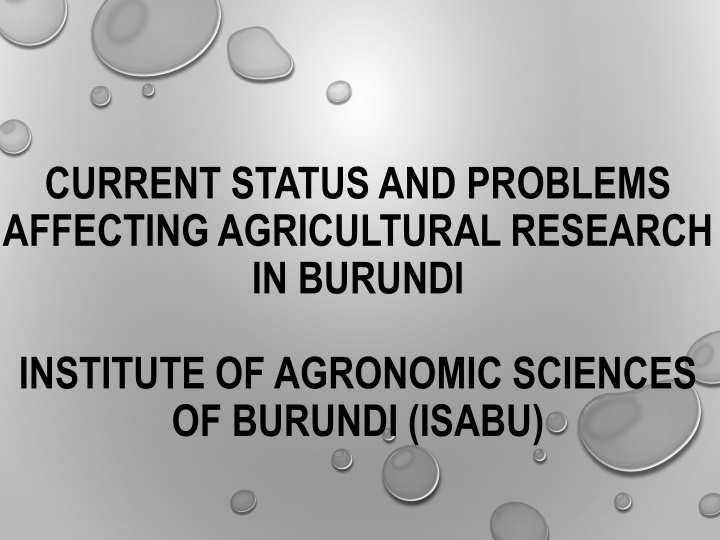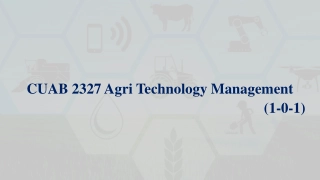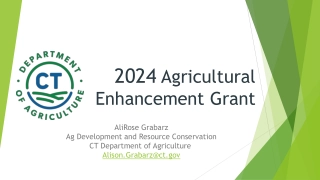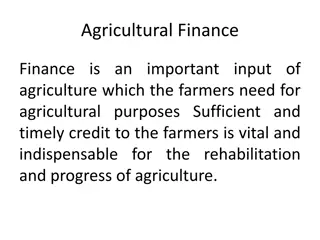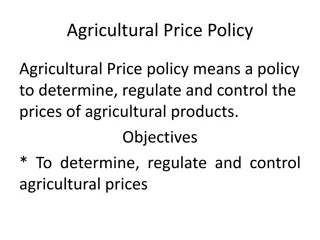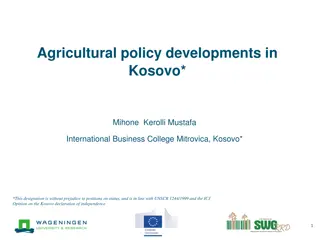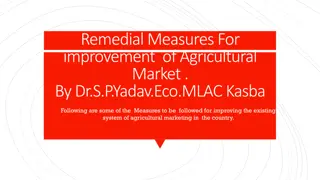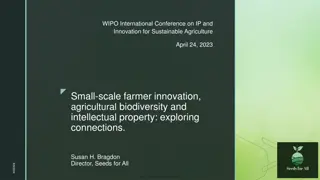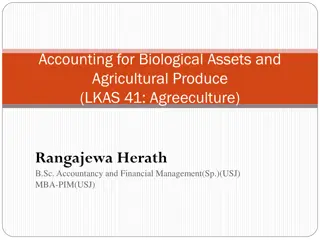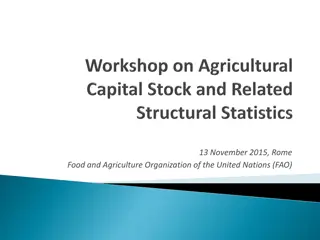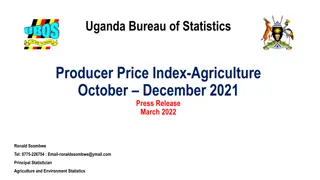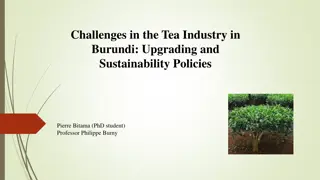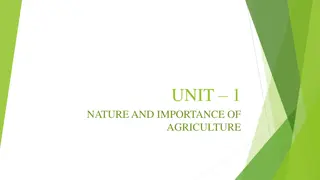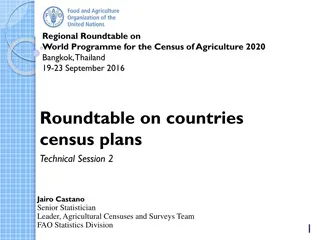Agricultural Research in Burundi: Current Status and Challenges
Agricultural research in Burundi is mainly conducted by ISABU and other institutions, focusing on agri-breeding, food technology, and animal health. ISABU plays a key role in coordinating research initiatives and promoting scientific development in agriculture. Vision, mission, and mandate guide their efforts, with a national mandate to centralize and validate research results for adoption. Collaboration with national and international partners enhances research impact across the agricultural sector.
Download Presentation

Please find below an Image/Link to download the presentation.
The content on the website is provided AS IS for your information and personal use only. It may not be sold, licensed, or shared on other websites without obtaining consent from the author.If you encounter any issues during the download, it is possible that the publisher has removed the file from their server.
You are allowed to download the files provided on this website for personal or commercial use, subject to the condition that they are used lawfully. All files are the property of their respective owners.
The content on the website is provided AS IS for your information and personal use only. It may not be sold, licensed, or shared on other websites without obtaining consent from the author.
E N D
Presentation Transcript
CURRENT STATUS AND PROBLEMS AFFECTING AGRICULTURAL RESEARCH IN BURUNDI INSTITUTE OF AGRONOMIC SCIENCES OF BURUNDI (ISABU)
Types of agricultural research carried out in Burundi 1. Agricultural Research (Agri-breeding) o ISABU (Institute of Agronomic Sciences of Burundi) o IRAZ (Agronomic and Zootechnical Research Institute) o The faculties of agricultural sciences of university institutions (FABI, FACAGRO / NGOZI) o The programs of CGIARs located in Burundi (IRRI, IITA, Bioversity, ILRI, etc.) 2. Food Technology Research o CNTA (National Center for Food Technology) o ISABU (PVPAE, embryonic stage) 3. Animal Health Research o National veterinary laboratory
Institute of Agronomic Sciences of Burundi Public administrative establishment, placed under the supervision of the Minister in charge of Agriculture and Livestock; Created by legislative ordinance n B7 / 11 of June 22, 1962 The order of its creation has been reviewed by o Decree No. 100/202 of 9/15/2014 reorganizing ISABU and o Ministerial Order No. 710/1862 of 11/28/2014, organizing the ISABU services.
Vision, Mission and Mandate Vision: To contribute to the establishment of a dynamic agricultural sector based on innovations, knowledge and approaches that meet the needs of users of research results Mission: To promote the scientific development of agriculture and animal husbandry in Burundi. National mandate to coordinate agricultural research in Burundi. In this capacity, ISABU guides research initiatives, centralizes and validates their results before transferring (Giving them back) to the services and partners in charge of extension for their use and adoption.
ISABU Geographic Coverage 6 regional research stations 20 Innovation Centers
. Collaboration and partnerships National CNTA, UB/FABI, UN/FACAGRO, ONCCS, OTB, COPROSEBU, FERMIERS, BREEDERS, ONCCS, ODECA, SRDI, SOSUMO, COGERCO, PRODEFI, PAIOSA, AGROBIOTEC, WV, CRS, NGOs International CIP, CIAT, IRRI, CYMMIT, ICRISAT, ILRI, IITA, Bioversity International, CABI-Plantwise etc. Regional ASARECA, FARA, PABRA, NARO, KARLO, RAB, TARI, INERA ISABU Main Donors Government of Burundi, ADB, WB, EU, IFAD, SDC, BADEA
Area of intervention 1. Food crops and oilseeds 2. Industrial crops for export 3. Horticulture 4. Indigenous and medicinal cultures 5. Improvement of livestock performance (breeding) 6. Agricultural and livestock products promotion 7. Agrarian systems and rural economy 8. Agriculture and environment 9. Laboratories 10. Prebase seeds 11. Scientific documentation and communication 12. Biometrics and Computing 13. Training and Service
Opportunities for Agricultural Research in Burundi Burundi's organizations at the National, regional and international levels; partnership agreements with research The existence of the National Development Plan (NDP/PND) of Burundi [2018-2027], strategies and sector policies favorable for agricultural research; The existence of an Agricultural Research Master Plan (ARMP/PDRA) Strategic vision 2021-2030 The manifest desire of the Government of Burundi to make science, technology and research a tool for sustainable development;
Constraints/challenges of agricultural research in Burundi 1. Low level of investment and funding for research; 2. Less adapted infrastructure and equipment; 3. Low capacity in human resources (researchers) having acquired in-depth knowledge in their fields of expertise. 4. Lack of a body for guidance, regulation and coordination of agricultural research institutes and centers in Burundi (Each center works for itself).
Constraints/challenges of agricultural research in Burundi 5. Low level of understanding of the concept of "research" by policy makers, 6. An imbalance in salaries between research institutions which often leads to the instability of human resources, 7. Low scientific diversity: Several areas of research do not have specialist researchers. (Livestock, industrial crops, horticulture, laboratories, Processing etc.). 8. Lack of control of climate change (irrigation system, greenhouse agriculture, food conservation, etc.)
What to do 1. Establish a national strategy for training and rational management of human resources by priority area (UNIVERSITY) 2. Review financial system by priority (GOVERNMENT) 3. Put in place strategies to circumvent climate change (ALL) 4. Identify priority research areas (RESEARCH INSTITUTES) 5. Evolve towards market agriculture (mindset change )
